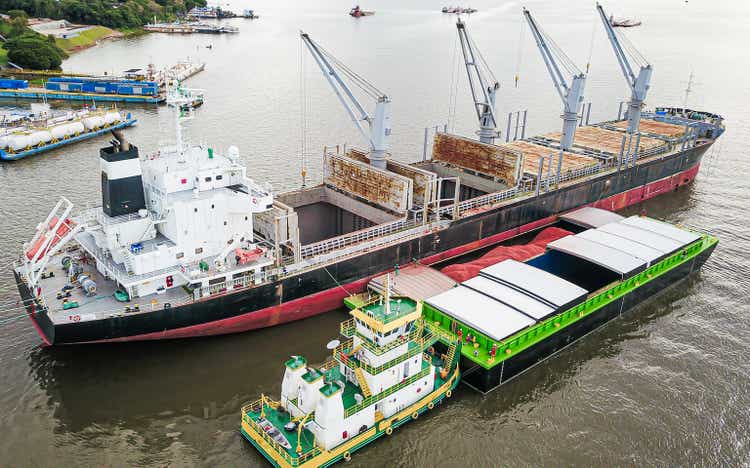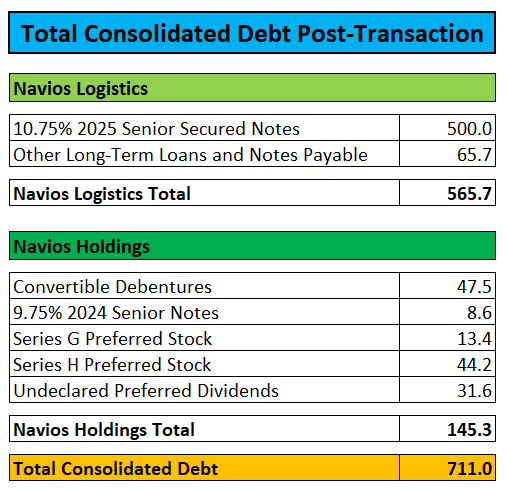Demerson Mendes/iStock via Getty Images
On Wednesday, debt-laden dry bulk shipper Navios Maritime Holdings (NYSE:NM) or “Navios Holdings” received a $835 million bailout package from former subsidiary Navios Maritime Partners (NMM) or “Navios Partners”:
Navios Maritime Holdings Inc. (“Navios Holdings” or the “Company”) , announced today a definitive agreement providing for the sale of its 36-vessel drybulk fleet for an aggregate consideration of approximately $835.0 million consisting of cash and the assumption of bank debt and finance leases related to the vessels and subject to working capital adjustment at closing, to Navios Maritime Partners L.P.
The aggregate transaction consideration is expected to reduce Navios Holdings’ liabilities by approximately $784.2 million, comprising of:
- $441.6 million in debt and finance leases being assumed by Navios Partners.
- Repayment of $262.6 million in loans provided by an entity affiliated with CEO and Chairwoman Angeliki Frangou eight months ago.
- Repayment of the remaining $80 million in 11.25% Senior Secured Notes at maturity on August 15.
The deal will result in the elimination of all short-term debt maturities and increase the company’s cash balance by an estimated $50 million.
In addition, Navios Holdings will report an approximately $100 million net book gain from the fleet sale in Q3.
The company’s remaining debt is mostly related to its consolidated subsidiary Navios South American Logistics (“Navios Logistics”):
Company SEC-Filings
Please note that the convertible debentures listed above have been issued to an entity controlled by Angeliki Frangou in connection with last year’s bailout and will be convertible into new common shares at a price of $3.93 per share.
In addition, there’s no obligation for the company to reinstate distributions for or redeem its Series G (NM.PG) and H ( NM.PH) Preferred Stock.
On the asset side, the company will be left with approximately $65 million in cash, a 10.3% stake in Navios Partners, its 63.8% stake in Navios Logistics and some incentive distribution rights (“IDRs”) related to Navios Partners.
In addition, I wouldn’t assign much, if any value to the Navios Partners IDRs either given how far they are out of the money at this point.
In aggregate, the stake in Navios Partners and the company’s cash balance represent approximately $157 million in liquid assets, just slightly above the $145.3 million in remaining debt and preferred stock listed above.
With the stake in Navios Logistics currently being more of a liability than an asset, it’s difficult to assign any sort of net asset value (“NAV”) to the company right now.
Given this issue, investors in Navios Holdings will have to hope for the Navios Logistics business to improve quite meaningfully going forward or Angeliki Frangou taking the company private at a large premium to the current share price.
Bottom Line
While last week’s fleet sale has saved Navios Holdings from a near-term bankruptcy filing, it’s difficult to assign any tangible value to the shares at this point.
Effectively, both the common and preferred stock now represent options on major improvements at Navios Logistics or a buyout at favorable terms by Angeliki Frangou going forward.
Quite frankly, I don’t consider these being reasonably expectations at this point.
Given the issues discussed above, investors should avoid both the common and preferred shares or sell existing positions and rather consider a speculative investment in former subsidiary Navios Partners.
In contrast to Navios Holdings, Navios Partners still trades at a 70%+ discount to NAV despite generating decent amounts of cash from operations after swallowing the group’s containership and tanker subsidiaries in recent quarters.
On Thursday. Navios Partners also announced a $100 million common unit buyback program
With the Navios Holdings overhang now being addressed in a non-dilutive manner, risks for investors in Navios Partners appear to have decreased substantially.
Speculative investors with the ability to stomach inherent volatility in shipping stocks should avoid shares of Navios Holdings and rather consider adding some Navios Partners common units to their portfolio.


Be the first to comment